Module 5 Lao She Teahouse. Unit 3 Language in use课件46张
文档属性
| 名称 | Module 5 Lao She Teahouse. Unit 3 Language in use课件46张 |
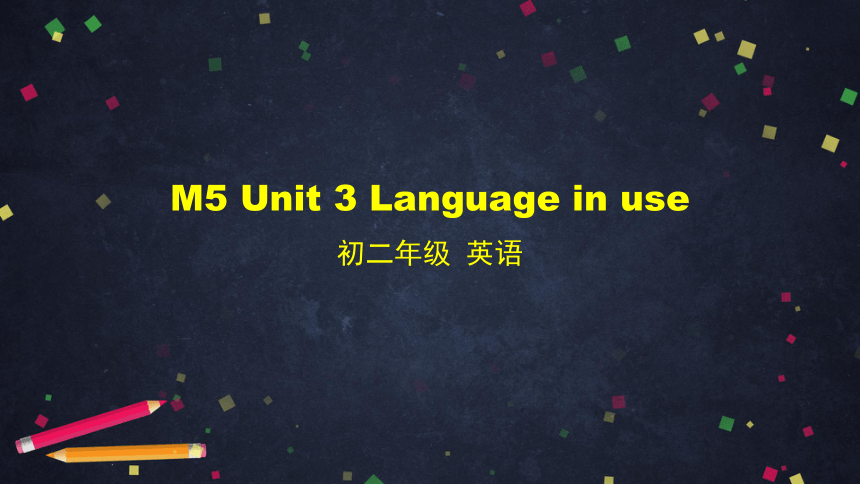
|
|
| 格式 | pptx | ||
| 文件大小 | 8.0MB | ||
| 资源类型 | 教案 | ||
| 版本资源 | 外研版 | ||
| 科目 | 英语 | ||
| 更新时间 | 2021-02-20 00:00:00 | ||
图片预览

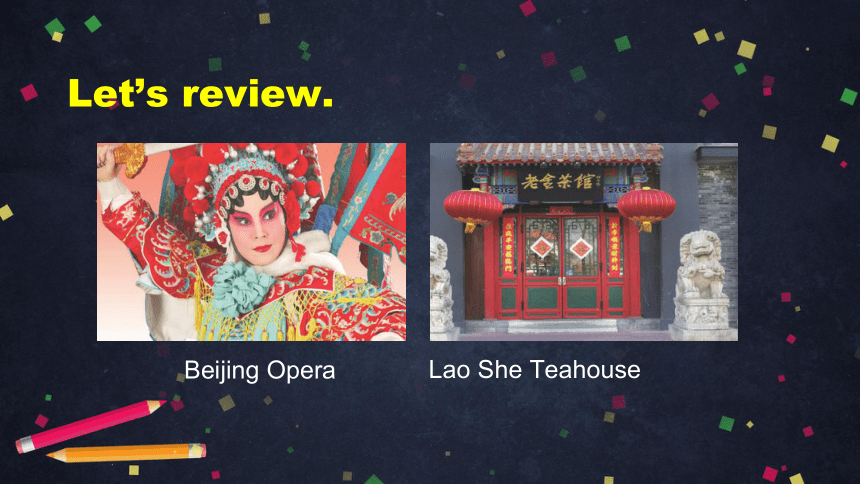


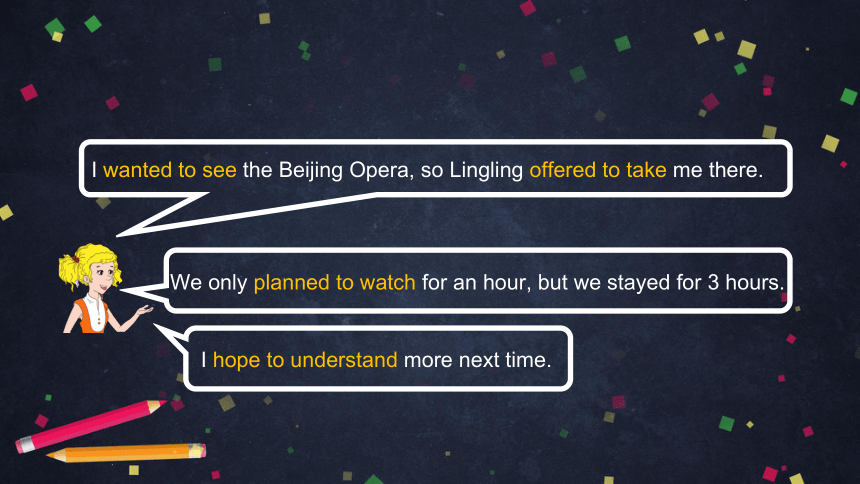
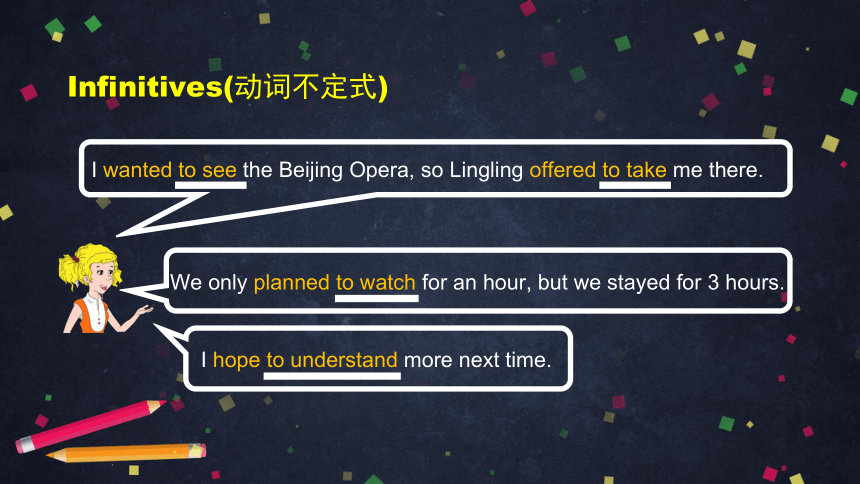
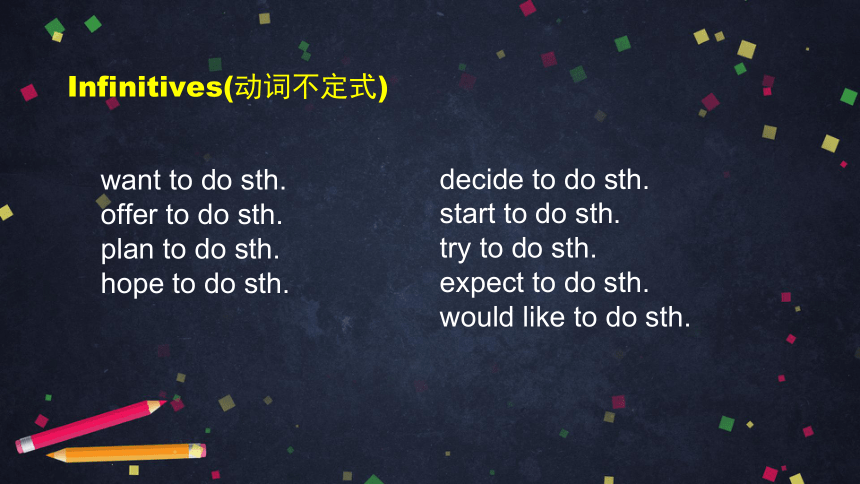


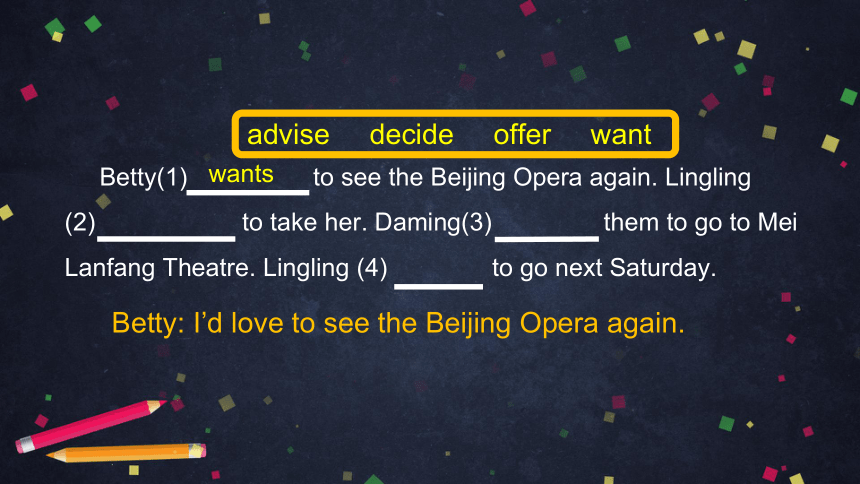
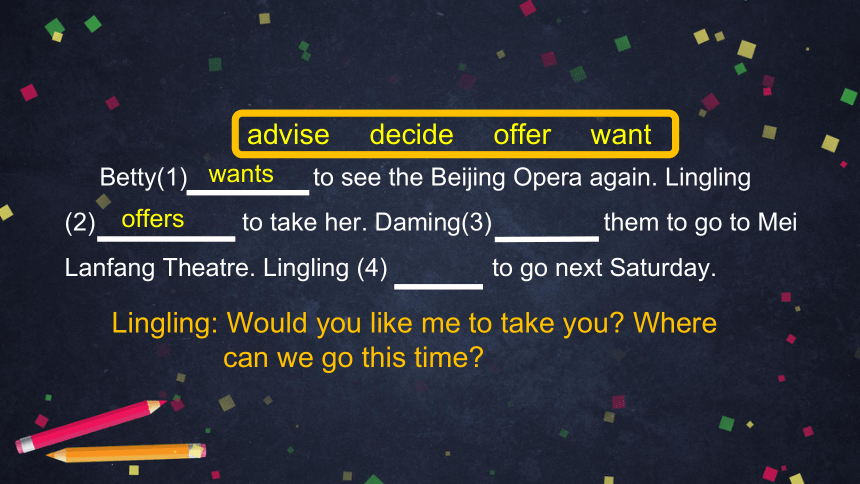
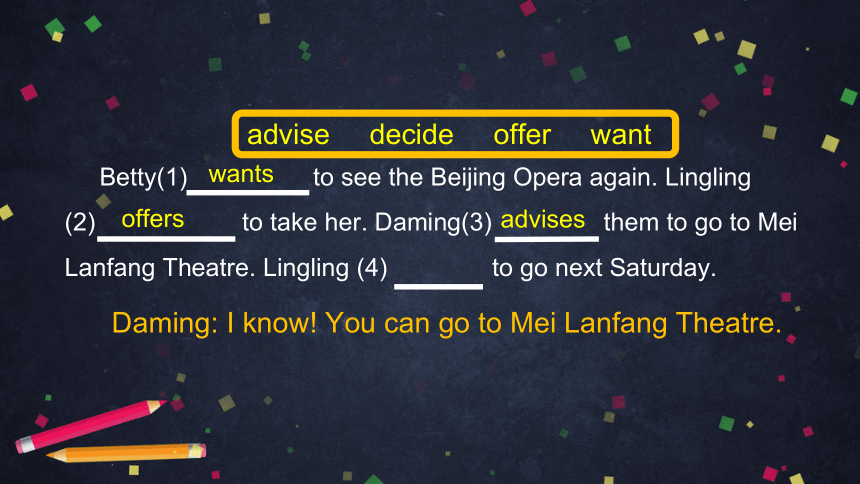
文档简介
M5 Unit 3 Language in use
初二年级 英语
Let’s review.
Beijing Opera
Lao She Teahouse
Let’s review.
Teahouse
Lao She
I wanted to see the Beijing Opera, so Lingling offered to take me there.
We only planned to watch for an hour, but we stayed for 3 hours.
I hope to understand more next time.
I wanted to see the Beijing Opera, so Lingling offered to take me there.
We only planned to watch for an hour, but we stayed for 3 hours.
I hope to understand more next time.
I wanted to see the Beijing Opera, so Lingling offered to take me there.
We only planned to watch for an hour, but we stayed for 3 hours.
I hope to understand more next time.
Infinitives(动词不定式)
want to do sth.
offer to do sth.
plan to do sth.
hope to do sth.
decide to do sth.
start to do sth.
try to do sth.
expect to do sth.
would like to do sth.
Infinitives(动词不定式)
1. We decided at home because it was raining.
2. Lao She started Chinese in London in 1924.
3. I tried poems.
4. They plan a film tomorrow.
5. I want my holiday in Beijing.
see spend stay teach write
to stay
to teach
to write
to see
to spend
Complete the sentences. (Activity 1)
Betty: I’d love to see the Beijing Opera again.
Lingling: Would you like me to take you? Where can we
go this time?
Daming: I know! You can go to Mei Lanfang Theatre.
Lingling: Good idea! Let’s go next Saturday. Betty.
Read the conversation and complete the note. (Activity 2)
advise decide offer want
Betty(1) to see the Beijing Opera again. Lingling
(2) to take her. Daming(3) them to go to Mei Lanfang Theatre. Lingling (4) to go next Saturday.
Betty: I’d love to see the Beijing Opera again.
wants
advise decide offer want
Betty(1) to see the Beijing Opera again. Lingling
(2) to take her. Daming(3) them to go to Mei Lanfang Theatre. Lingling (4) to go next Saturday.
Lingling: Would you like me to take you? Where
can we go this time?
offers
wants
advise decide offer want
Betty(1) to see the Beijing Opera again. Lingling
(2) to take her. Daming(3) them to go to Mei Lanfang Theatre. Lingling (4) to go next Saturday.
Daming: I know! You can go to Mei Lanfang Theatre.
advises
offers
wants
advise decide offer want
Betty(1) to see the Beijing Opera again. Lingling
(2) to take her. Daming(3) them to go to Mei Lanfang Theatre. Lingling (4) to go next Saturday.
Lingling: Good idea! Let’s go next Saturday. Betty.
decides
advises
offers
wants
Lu Xun is one of the greatest writers of modern China. He was born in Shaoxing, Zhejiang Province, in 1881. At first, Lu Xun hoped (help) the Chinese people become healthy and strong, so he decided (be) a doctor.
to help
to be
Complete the passage. (Activity 3)
After a few years, he started (write) short stories because he wanted (teach) people about society. One of his most famous stories is The True Story of Ah Q. It describes the hard life of Ah Q and makes people (think) about society. In the 1920s, people began to translate his works into English.
to teach
think
Let’s practice. (Activity 3)
to write
make表示让、使某人做某事,后面接省略to的不定式,即make sb. do sth.
It describes the hard life of Ah Q and makes people think about society.
Nothing could make Professor Qian Xuesen give up the thought of returning to his motherland.
没有什么可以使钱学森教授放弃回到祖国的想法。
Lao She Teahouse
1. Who is visiting London?
a) Vicky. b) Steve. c) Romeo.
2. What are they talking about?
a) Romeo and Juliet. b) London. c) Vicky’s parents.
Listen and choose the correct answer.
(Activity 5)
1. Who is visiting London?
a) Vicky. b) Steve. c) Romeo.
Hello Steve, are you enjoying your visit to London?
Listen and choose the correct answer.
(Activity 5)
1. Who is visiting London?
a) Vicky. b) Steve. c) Romeo.
Hello Steve, are you enjoying your visit to London?
Listen and choose the correct answer.
(Activity 5)
2. What are they talking about?
a) Romeo and Juliet.
b) London.
c) Vicky’s parents.
Vicky: Hello Steve, are you enjoying your visit to London?
Steve: Thank you for asking... We went to Shakespeare’s Globe
Theatre... and we decided to see Romeo and Juliet...
Vicky: Did you understand the play...
Steve: Well I tried to understand the words. It was very difficult.
Vicky: I hope to see Romeo and Juliet too...
Steve: Will your parents agree to take you?
Vicky: Yes, I’m sure they will.
Vicky: Hello Steve, are you enjoying your visit to London?
Steve: Thank you for asking... We went to Shakespeare’s Globe
Theatre... and we decided to see Romeo and Juliet...
Vicky: Did you understand the play...
Steve: Well I tried to understand the words. It was very difficult.
Vicky: I hope to see Romeo and Juliet too...
Steve: Will your parents agree to take you?
Vicky: Yes, I’m sure they will.
2. What are they talking about?
a) Romeo and Juliet.
b) London.
c) Vicky’s parents.
1. Steve went to Shakespeare’s Globe Theatre last night. ( )
2. Vicky offered to take Steve to the theatre. ( )
3. Steve did not try to understand the words. ( )
4. Vicky hopes to see her favourite play. ( )
5. Vicky thinks her parents will take her to the theatre. ( )
Listen again and check (√) the true sentences.
(Activity 6)
1. Steve went to Shakespeare’s Globe Theatre last night. ( )
Steve: Thank you for asking. I’m having a great time.
We went to Shakespeare’s Globe Theatre last night.
√
Listen again and check (√) the true sentences.
(Activity 6)
The Globe Theatre (环球剧院)
Built in 1599
2. Vicky offered to take Steve to the theatre. ( )
Steve: We went to Shakespeare’s Globe Theatre last night.
Vicky: Oh yes, that’s great. A lot of tourists want to go there.
Steve: Yes, my uncle offered to take me there...
Steve’s uncle
Listen again and check (√) the true sentences.
(Activity 6)
3. Steve did not try to understand the words. ( )
Steve: I tried to undertand the words. It was very difficult.
tried
Listen again and check (√) the true sentences.
(Activity 6)
4. Vicky hopes to see her favourite play. ( )
Vicky: I hope to see Romeo and Juliet too. It’s my favourite play.
√
Listen again and check (√) the true sentences.
(Activity 6)
√
Steve: Will your parents agree to take you?
Vicky: Yes, I’m sure they will.
5. Vicky thinks her parents will take her to the theatre. ( )
Listen again and check (√) the true sentences.
(Activity 6)
1. Steve went to Shakespeare’s Globe Theatre last night.
2. Steve’s uncle offered to take Steve to the theatre.
3. Steve tried to understand the words.
4. Vicky hopes to see her favourite play.
5. Vicky thinks her parents will take her to the theatre.
Look at the sentences again.
hope how about let’s want why don’t we why not would like
— I want to see the Beijing Opera.
— Why don’t we ... ?
Work in pairs. Talk about your weekend plan. (Activity 7)
hope to do sth.
want to do sth.
would like to do sth.
How about doing sth.?
Let’s do sth.
Why don’t we do sth.?
Why not do sth.?
hope how about let’s want why don’t we why not would like
Work in pairs. Talk about your weekend plan. (Activity 7)
hope to do sth.
want to do sth.
would like to do sth.
How about doing sth.?
Let’s do sth.
Why don’t we do sth.?
Why not do sth.?
— I want to see the Beijing Opera.
— Why don’t we go to Lao She Teahouse?
— Good Idea! I hope to understand more this time.
— Why not go online and find more information about the story?
cheer magic take place theatre wonderful
We went to the last night to see a play. I had a
evening. The play was very good and all the actors were excellent. The story in a small village in China. It was all about an old box of gold! The box was a box and was difficult to open. The play was very interesting, and everyone
at the end of the play!
Complete the passage. (Activity 4)
theatre
magic
took place
wonderful
cheered
Read the passage and choose the correct answer. (Activity 8)
This year’s school play was a very good choice. Teahouse, by Lao She, is famous and interesting.
1. You would find the passage in .
a) a book
b) a school newspaper
c) a magazine
Read the passage and choose the correct answer. (Activity 8)
2. The writer .
a) liked the play
b) did not like the play
c) did not say he liked the play or not
I had a great time at the theatre. It was easy for everyone to understand the story and see the changes in Chinese society.
Read the passage and choose the correct answer. (Activity 8)
The actors’ and actresses’ clothes and the teahouse furniture were right for the first half of the twentieth century.
3. The actors and actresses in the play wore .
a) the same clothes as today
b) their best clothes
c) clothes of the first half of the twentieth century
Read the passage and choose the correct answer. (Activity 8)
4. Li Nan is .
a) a famous actor
b) a student
c) an actress
Li Nan, the student playing Wang Lifa, the owner of the teahouse, was the best. He brought Wang Lifa to life from
a young man to an old man.
Read the passage and choose the correct answer. (Activity 8)
Western theatre started in Greece, around 600 BC. The theatres were very big. About 15,000 people could watch a play at the same time. The audience sat on stone seats to watch the performances. Some of the theatres survive, as do some of the plays by ancient Greek writers. People still watch these plays.
Around the world: Theatres
1. 动词不定式 to do
2. 中外戏剧
Summary
完成课本第41页Module task.
Homework
Thank you!
初二年级 英语
Let’s review.
Beijing Opera
Lao She Teahouse
Let’s review.
Teahouse
Lao She
I wanted to see the Beijing Opera, so Lingling offered to take me there.
We only planned to watch for an hour, but we stayed for 3 hours.
I hope to understand more next time.
I wanted to see the Beijing Opera, so Lingling offered to take me there.
We only planned to watch for an hour, but we stayed for 3 hours.
I hope to understand more next time.
I wanted to see the Beijing Opera, so Lingling offered to take me there.
We only planned to watch for an hour, but we stayed for 3 hours.
I hope to understand more next time.
Infinitives(动词不定式)
want to do sth.
offer to do sth.
plan to do sth.
hope to do sth.
decide to do sth.
start to do sth.
try to do sth.
expect to do sth.
would like to do sth.
Infinitives(动词不定式)
1. We decided at home because it was raining.
2. Lao She started Chinese in London in 1924.
3. I tried poems.
4. They plan a film tomorrow.
5. I want my holiday in Beijing.
see spend stay teach write
to stay
to teach
to write
to see
to spend
Complete the sentences. (Activity 1)
Betty: I’d love to see the Beijing Opera again.
Lingling: Would you like me to take you? Where can we
go this time?
Daming: I know! You can go to Mei Lanfang Theatre.
Lingling: Good idea! Let’s go next Saturday. Betty.
Read the conversation and complete the note. (Activity 2)
advise decide offer want
Betty(1) to see the Beijing Opera again. Lingling
(2) to take her. Daming(3) them to go to Mei Lanfang Theatre. Lingling (4) to go next Saturday.
Betty: I’d love to see the Beijing Opera again.
wants
advise decide offer want
Betty(1) to see the Beijing Opera again. Lingling
(2) to take her. Daming(3) them to go to Mei Lanfang Theatre. Lingling (4) to go next Saturday.
Lingling: Would you like me to take you? Where
can we go this time?
offers
wants
advise decide offer want
Betty(1) to see the Beijing Opera again. Lingling
(2) to take her. Daming(3) them to go to Mei Lanfang Theatre. Lingling (4) to go next Saturday.
Daming: I know! You can go to Mei Lanfang Theatre.
advises
offers
wants
advise decide offer want
Betty(1) to see the Beijing Opera again. Lingling
(2) to take her. Daming(3) them to go to Mei Lanfang Theatre. Lingling (4) to go next Saturday.
Lingling: Good idea! Let’s go next Saturday. Betty.
decides
advises
offers
wants
Lu Xun is one of the greatest writers of modern China. He was born in Shaoxing, Zhejiang Province, in 1881. At first, Lu Xun hoped (help) the Chinese people become healthy and strong, so he decided (be) a doctor.
to help
to be
Complete the passage. (Activity 3)
After a few years, he started (write) short stories because he wanted (teach) people about society. One of his most famous stories is The True Story of Ah Q. It describes the hard life of Ah Q and makes people (think) about society. In the 1920s, people began to translate his works into English.
to teach
think
Let’s practice. (Activity 3)
to write
make表示让、使某人做某事,后面接省略to的不定式,即make sb. do sth.
It describes the hard life of Ah Q and makes people think about society.
Nothing could make Professor Qian Xuesen give up the thought of returning to his motherland.
没有什么可以使钱学森教授放弃回到祖国的想法。
Lao She Teahouse
1. Who is visiting London?
a) Vicky. b) Steve. c) Romeo.
2. What are they talking about?
a) Romeo and Juliet. b) London. c) Vicky’s parents.
Listen and choose the correct answer.
(Activity 5)
1. Who is visiting London?
a) Vicky. b) Steve. c) Romeo.
Hello Steve, are you enjoying your visit to London?
Listen and choose the correct answer.
(Activity 5)
1. Who is visiting London?
a) Vicky. b) Steve. c) Romeo.
Hello Steve, are you enjoying your visit to London?
Listen and choose the correct answer.
(Activity 5)
2. What are they talking about?
a) Romeo and Juliet.
b) London.
c) Vicky’s parents.
Vicky: Hello Steve, are you enjoying your visit to London?
Steve: Thank you for asking... We went to Shakespeare’s Globe
Theatre... and we decided to see Romeo and Juliet...
Vicky: Did you understand the play...
Steve: Well I tried to understand the words. It was very difficult.
Vicky: I hope to see Romeo and Juliet too...
Steve: Will your parents agree to take you?
Vicky: Yes, I’m sure they will.
Vicky: Hello Steve, are you enjoying your visit to London?
Steve: Thank you for asking... We went to Shakespeare’s Globe
Theatre... and we decided to see Romeo and Juliet...
Vicky: Did you understand the play...
Steve: Well I tried to understand the words. It was very difficult.
Vicky: I hope to see Romeo and Juliet too...
Steve: Will your parents agree to take you?
Vicky: Yes, I’m sure they will.
2. What are they talking about?
a) Romeo and Juliet.
b) London.
c) Vicky’s parents.
1. Steve went to Shakespeare’s Globe Theatre last night. ( )
2. Vicky offered to take Steve to the theatre. ( )
3. Steve did not try to understand the words. ( )
4. Vicky hopes to see her favourite play. ( )
5. Vicky thinks her parents will take her to the theatre. ( )
Listen again and check (√) the true sentences.
(Activity 6)
1. Steve went to Shakespeare’s Globe Theatre last night. ( )
Steve: Thank you for asking. I’m having a great time.
We went to Shakespeare’s Globe Theatre last night.
√
Listen again and check (√) the true sentences.
(Activity 6)
The Globe Theatre (环球剧院)
Built in 1599
2. Vicky offered to take Steve to the theatre. ( )
Steve: We went to Shakespeare’s Globe Theatre last night.
Vicky: Oh yes, that’s great. A lot of tourists want to go there.
Steve: Yes, my uncle offered to take me there...
Steve’s uncle
Listen again and check (√) the true sentences.
(Activity 6)
3. Steve did not try to understand the words. ( )
Steve: I tried to undertand the words. It was very difficult.
tried
Listen again and check (√) the true sentences.
(Activity 6)
4. Vicky hopes to see her favourite play. ( )
Vicky: I hope to see Romeo and Juliet too. It’s my favourite play.
√
Listen again and check (√) the true sentences.
(Activity 6)
√
Steve: Will your parents agree to take you?
Vicky: Yes, I’m sure they will.
5. Vicky thinks her parents will take her to the theatre. ( )
Listen again and check (√) the true sentences.
(Activity 6)
1. Steve went to Shakespeare’s Globe Theatre last night.
2. Steve’s uncle offered to take Steve to the theatre.
3. Steve tried to understand the words.
4. Vicky hopes to see her favourite play.
5. Vicky thinks her parents will take her to the theatre.
Look at the sentences again.
hope how about let’s want why don’t we why not would like
— I want to see the Beijing Opera.
— Why don’t we ... ?
Work in pairs. Talk about your weekend plan. (Activity 7)
hope to do sth.
want to do sth.
would like to do sth.
How about doing sth.?
Let’s do sth.
Why don’t we do sth.?
Why not do sth.?
hope how about let’s want why don’t we why not would like
Work in pairs. Talk about your weekend plan. (Activity 7)
hope to do sth.
want to do sth.
would like to do sth.
How about doing sth.?
Let’s do sth.
Why don’t we do sth.?
Why not do sth.?
— I want to see the Beijing Opera.
— Why don’t we go to Lao She Teahouse?
— Good Idea! I hope to understand more this time.
— Why not go online and find more information about the story?
cheer magic take place theatre wonderful
We went to the last night to see a play. I had a
evening. The play was very good and all the actors were excellent. The story in a small village in China. It was all about an old box of gold! The box was a box and was difficult to open. The play was very interesting, and everyone
at the end of the play!
Complete the passage. (Activity 4)
theatre
magic
took place
wonderful
cheered
Read the passage and choose the correct answer. (Activity 8)
This year’s school play was a very good choice. Teahouse, by Lao She, is famous and interesting.
1. You would find the passage in .
a) a book
b) a school newspaper
c) a magazine
Read the passage and choose the correct answer. (Activity 8)
2. The writer .
a) liked the play
b) did not like the play
c) did not say he liked the play or not
I had a great time at the theatre. It was easy for everyone to understand the story and see the changes in Chinese society.
Read the passage and choose the correct answer. (Activity 8)
The actors’ and actresses’ clothes and the teahouse furniture were right for the first half of the twentieth century.
3. The actors and actresses in the play wore .
a) the same clothes as today
b) their best clothes
c) clothes of the first half of the twentieth century
Read the passage and choose the correct answer. (Activity 8)
4. Li Nan is .
a) a famous actor
b) a student
c) an actress
Li Nan, the student playing Wang Lifa, the owner of the teahouse, was the best. He brought Wang Lifa to life from
a young man to an old man.
Read the passage and choose the correct answer. (Activity 8)
Western theatre started in Greece, around 600 BC. The theatres were very big. About 15,000 people could watch a play at the same time. The audience sat on stone seats to watch the performances. Some of the theatres survive, as do some of the plays by ancient Greek writers. People still watch these plays.
Around the world: Theatres
1. 动词不定式 to do
2. 中外戏剧
Summary
完成课本第41页Module task.
Homework
Thank you!
同课章节目录
- Module 1 How to learn English
- Unit 1 Let's try to speak English as much as possi
- Unit 2 You should smile at her.
- Unit 3 Language in use .
- Module 2 My home town and my country
- Unit 1 It's taller than many other buildings.
- Unit 2 Cambridge is a beautiful city in the east o
- Unit 3 Language in use .
- Module 3 Sports.
- Unit 1 Nothing is more exciting than playing tenni
- Unit 2 This year we training more carefully.
- Unit 3 Language in use .
- Module 4 Planes, ships and trains .
- Unit 1 He lives the farthest from school.
- Unit 2 What is the best way to travel.
- Unit 3 Language in use .
- Module 5 Lao She Teahouse.
- Unit 1 I wanted to see the Beijing Opera.
- Unit 2 It descibes the changes in Chinese society.
- Unit 3 Language in use .
- Module 6 Animals in danger.
- Unit 1 It allows people to get closer to them .
- Unit 2 The WWF is working hard to save them all.
- Unit 3 Language in use .
- Revision module A
- Module 7 A famous story
- Unit 1 Alice was sitting with her sister by the ri
- Unit 2 She was thinking about her cat.
- Unit 3 Language in use .
- Module 8 Accidents
- Unit 1 While the car were changing to red, a car s
- Unit 2 I was trying to pick it up when it bite me
- Unit 3 Language in use .
- Module 9 Population
- Unit 1 The population of China is about 1.37 billi
- Unit 2 Arnwick was a city with 200,000 people.
- Unit 3 Language in use .
- Module 10 The weathe
- Unit 1 It might snow.
- Unit 2 The weather is fine all year round.
- Unit 3 Language in use .
- Module 11 Way of life
- Unit 1 In China ,we open a gift later.
- Unit 2 In England, you usually drink tea with milk
- Unit 3 Language in use .
- Module 12 Help
- Unit 1 What should we do before help arrives?
- Unit 2 Stay away from windows and heavy furniture.
- Unit 3 Language in use .
- Revision module B
